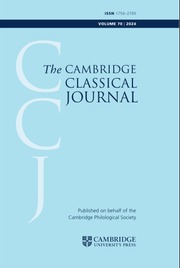Article contents
Epicureans on kingship*
Published online by Cambridge University Press: 23 January 2012
Extract
Diogenes Laertius lists in his catalogue of Epicurus' works (10.28) a treatise On Kingship, which is unfortunately no longer extant. Owing to the Epicureans' antipathy to politics, such a work might be viewed with surprise and presumed to be virulently negative in outlook. Indeed, Plutarch reports that the Epicureans wrote on kingship only to ward people away from living in the company of kings (Adv. Col. 1127a) and that they maintained that to be king oneself was a terrible mistake (Adv. Col. 1125c-d). However, the scattered evidence that remains suggests the Epicurean views on kingship were both nuanced and sophisticated. In this paper I seek to reconstruct a viable account of the Epicurean position on kingship.
- Type
- Research Article
- Information
- Copyright
- Copyright © The Author(s). Published online by Cambridge University Press 2010
References
WORKS CITED
- 1
- Cited by




